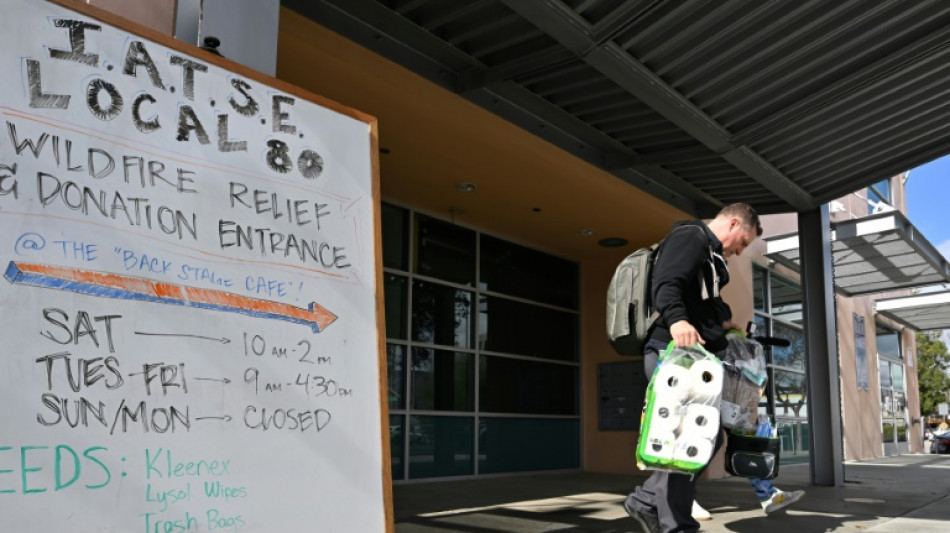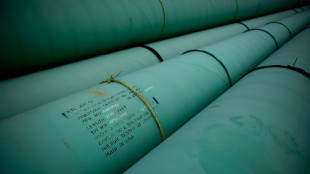

Fires, strikes, pandemic and AI: Hollywood workers can't catch a break
Dutch Merrick isn't really in a party mood for this year's Oscars.
As for many below-the-line Hollywood workers, life has been hard for the veteran prop master, and became even more difficult when he lost his home in the deadly fires that ravaged Los Angeles in January.
The personal tragedy couldn't have come at a worse time for Merrick.
Between the historic twin strikes that paralyzed Hollywood for much of 2023, the upheavals linked to streaming and the exodus of production projects from California, he hasn't had a big job in two years.
"Work disappeared," says Merrick, who specializes in supplying and ensuring the safe use of weaponry on sets.
"I don't think anyone in our generation could fathom that this workflow would just turn to a trickle."
He is now dependent on a food bank run by IATSE, the union for those working in Hollywood's technical trades -- editors, set designers, camera operators, costumers and makeup artists.
Volunteers see about 40 families every week at their premises near the Warner Bros. studios, stocking up on fruits, vegetables and other necessities.
Launched during the writers' and actors' strike in 2023, the initiative looks set to become a fixture, says union representative DeJon Ellis.
"The industry is in a contraction period, and it's slow compared to the past seven years," with around a third fewer jobs available, says Ellis.
"The fires compounded the problems."
- Streaming bubble bursts -
Film and television built Los Angeles, and has for decades played a significant role in the city's economy.
But 2024 logged the lowest number of days of filming in the region since records began -- with the exception of the pandemic standstill of 2020.
The reasons are complicated but, Ellis says, the bursting of the streaming bubble was a significant contributing factor.
Gone are the days when each studio tried to imitate Netflix, launching frequent glossy, high-budget TV series.
Shareholders are now looking for a return on their investments and want profits, instead of just the promise of growth.
As a result, studios are producing less and relocating what they do make -- if Los Angeles isn't losing out to other US destinations like New Mexico or Georgia, it's facing competition from tax-efficient destinations like Thailand, Hungary and South Africa.
"I think the very foundation of Hollywood has been shaken to the core," says Merrick.
"I honestly think tax incentives started the race to the bottom."
Much like departing automakers hollowed out Motor City, Merrick worries that Los Angeles could become a shell of its former self.
"I'm originally from Detroit, Michigan, and we've seen this script play out before," the armorer said.
"We've seen an entire industry outsourced to other regions where they can get cheaper and cheaper labor."
- Artificial intelligence -
Lawmakers under pressure to preserve a major industry are planning to double the tax credits available to companies filming in California.
But Veronica Kahn doubts that this will be enough in the face of fundamental changes in the way the audience thinks.
"People spend more time watching tons of 30-second videos on TikTok; they have less time to watch movies and series," the 42-year-old sound engineer told AFP.
And even very short productions are not being made the way they used to be.
"For the Super Bowl this year... there was a lot of artificial intelligence, and a lot of animation. So our jobs are already disappearing," she said.
Strikes by actors and writers that crippled Hollywood were in part about protecting them from the use of artificial intelligence and to demand better pay.
But Kahn says while the actors and the writers won, people like her lost.
When filming resumed in early 2024, "I was told that with all this extra money that they had to pay to the writers and the actors, they couldn't afford an additional person for sound."
Since then, "each time I'm meeting with producers, they tell me that it's for work outside of Los Angeles," she sighs.
Despite having cut back on eating out and -- ironically, perhaps -- cancelled her streaming subscriptions, Kahn still finds herself short and is grateful for the IATSE food bank.
"It really helps, any little bit helps," she says, gesturing to a bag filled with lemons, avocados and eggs.
Since the fires, studios have provided millions of dollars to help those affected, including the people who rely on them to make a living.
But in his union hall, Ellis would prefer those studios do something else.
"If you really want to help all the fire victims, make more movies and TV shows here in Los Angeles," he says.
T.Gruber--MP




